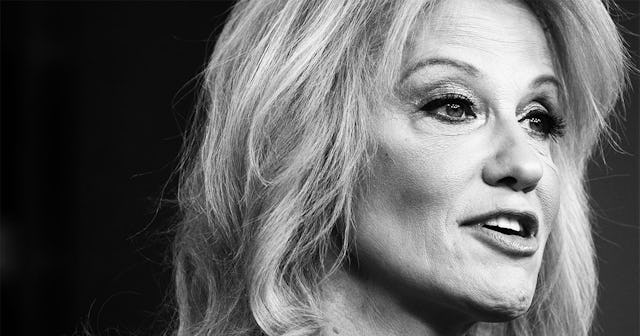What The 'Kellyanne Conway Tapes' Mean To Me, A Survivor Of Child Abuse

I never thought I would write an article about Kellyanne Conway. I mean, I’m not a fan of her professional endeavors or political beliefs. She’s not “in my circles” or someone I follow, and Kellyanne and I have very little in common. But when her daughter, Claudia, accused her of abuse earlier this week, I realized I needed to write about Donald Trump’s former campaign manager and advisor. Why? Because the videos which Claudia released on TikTok of (we assume) her mother yelling and screaming were horrifying. They were terrifying, and they were not okay. They were classic examples of verbal and emotional abuse. There was name calling and threats.
The audio also sounded eerily familiar.
I recognized the tone of her voice. The pitch. The tenor. I recognized both her insults and her words. And while I will not repeat the content of the tapes for fear of triggering others — I do not want to elevate the voices of offenders or give a platform to those who engage in victimization and abuse — I will share my story because my story, like Claudia’s, is one of castigation and manipulation. I have been yelled at and cursed at. I grew up being put down, and no one should be silenced and shamed.
No one should experience verbal or emotional abuse.
Ironically, my story didn’t start violently or intensely. My mother didn’t tell three-year-old me I was a failure or a “fuck up.” She didn’t put little Kim down. Instead, it started slowly and innocuously. My mother would coddle me and comfort me. She held me close, saying things like “You don’t want to hurt me, do you? Stay with me. Don’t leave me. I need you.”
As I grew, her words changed. “You’re nothing without me,” she would say. “You’re helpless and hopeless. Stay. You cannot make it on your own.” And by time I was Claudia’s age, her words were full of hate and vitriol. She regularly cursed and yelled at me, much as the woman in Claudia’s now viral video did.
“Fuck you!” she would say. “You don’t fucking listen! What the fuck is wrong with you?”
She also called me names. I was dumb. Stupid. Worthless. Once, she said I was a mistake. And years of abuse altered me. It changed me, and today, I am riddled with fear, afraid to move forward. To be alone. To make mistakes. To try. Today, I’m terrified of confrontation. Raised voices put me on edge. Today, I live with depression, anxiety, and PTSD. I have a hard time managing stressors, triggers, and flashbacks. I regularly have panic attacks. And like many survivors, today, I have a hard time completing tasks. Healthy relationships are also a struggle.
Of course, it should be noted that Claudia’s accusations against her mother are just that: accusations. We can believe Claudia (and I do), while saying that, from a legal standpoint, Conway hasn’t done a damn thing wrong. It frustrates me to say that, but is the truth. She hasn’t been charged with child neglect or abuse. But, and this is a big but, there is a silver lining to these tapes, because no matter who the woman in these tapes is, her actions highlight the manipulation and victimization which is all too common in toxic relationships. They serve as a clear-cut example of mental, social, emotional abuse — forms of abuse which are often underreported and misunderstood. And this has the power to help others.
It may save others.
“Abuse comes in many forms, not all of which are physical,” an article on Healthline reads. “When someone repeatedly uses words to demean, frighten, or control someone, it’s considered verbal abuse.” Humiliation, manipulation, condensation, and name-calling are also key markers of verbal and emotional abuse.
Other signs include:
- Frequent yelling and screaming
- Constant criticism and put downs
- Demonization
- Degradation
- Isolation
- Demeaning statements and accusations
- Controlling behaviors, i.e., abusers regularly tells their victims who they can and cannot be friends with; they also monitor communication devices and their schedule
- Blame and shame, i.e., abusers often use “you” statements like, “I had to yell because you made me angry”
Gaslighting is also common. They make you believe you are “crazy,” or at the very least, overly sensitive. Your account of events is (almost) always wrong.
The good news is there is help and hope. If you are being abused — or living in the shadow of abuse — you do not have to be hurt or victimized any more. This isn’t your cross to bear. Leave, if possible. Getting out of an unhealthy relationship is the best thing you can do. If you are the victim of child abuse, you can try to establish boundaries; however, contacting the police or Child Protective Services is your best bet. These adults have the power to help you, and protect you. You can also contact the Child Abuse Helpline at 1-800-422-4453. And if you are attempting to overcome childhood trauma, you should find (and work with) a licensed therapist or counselor. Trust me. You can also attend an ASCA, Adult Survivors of Child Abuse, support group.
Make no mistake: While this sounds easy — while overcoming, rather, undoing the effects of said abuse seems easy — I’ll be the first to tell you it isn’t. Leaving an abusive relationship is hard, and undoing the toxic tapes is damn near impossible. But you can do it. You can get out, and I promise you: There is light on the other side.
This article was originally published on